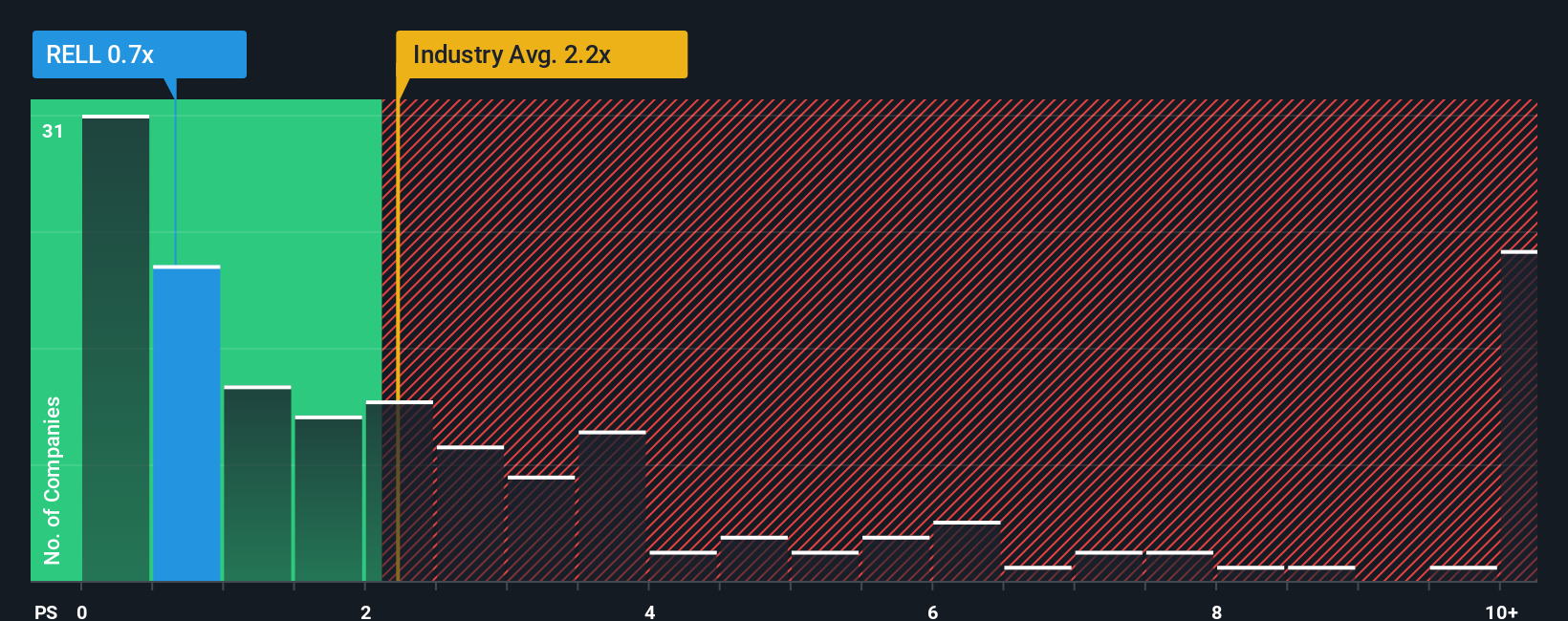- United States
- /
- Electronic Equipment and Components
- /
- NasdaqGS:RELL
There's No Escaping Richardson Electronics, Ltd.'s (NASDAQ:RELL) Muted Revenues
With a price-to-sales (or "P/S") ratio of 0.7x Richardson Electronics, Ltd. (NASDAQ:RELL) may be sending bullish signals at the moment, given that almost half of all the Electronic companies in the United States have P/S ratios greater than 2.2x and even P/S higher than 6x are not unusual. Nonetheless, we'd need to dig a little deeper to determine if there is a rational basis for the reduced P/S.
View our latest analysis for Richardson Electronics

What Does Richardson Electronics' P/S Mean For Shareholders?
With revenue growth that's inferior to most other companies of late, Richardson Electronics has been relatively sluggish. Perhaps the market is expecting the current trend of poor revenue growth to continue, which has kept the P/S suppressed. If this is the case, then existing shareholders will probably struggle to get excited about the future direction of the share price.
If you'd like to see what analysts are forecasting going forward, you should check out our free report on Richardson Electronics.Is There Any Revenue Growth Forecasted For Richardson Electronics?
There's an inherent assumption that a company should underperform the industry for P/S ratios like Richardson Electronics' to be considered reasonable.
Taking a look back first, we see that the company managed to grow revenues by a handy 6.2% last year. However, this wasn't enough as the latest three year period has seen an unpleasant 12% overall drop in revenue. Accordingly, shareholders would have felt downbeat about the medium-term rates of revenue growth.
Shifting to the future, estimates from the dual analysts covering the company suggest revenue should grow by 6.1% over the next year. With the industry predicted to deliver 17% growth, the company is positioned for a weaker revenue result.
With this in consideration, its clear as to why Richardson Electronics' P/S is falling short industry peers. It seems most investors are expecting to see limited future growth and are only willing to pay a reduced amount for the stock.
The Final Word
While the price-to-sales ratio shouldn't be the defining factor in whether you buy a stock or not, it's quite a capable barometer of revenue expectations.
As we suspected, our examination of Richardson Electronics' analyst forecasts revealed that its inferior revenue outlook is contributing to its low P/S. At this stage investors feel the potential for an improvement in revenue isn't great enough to justify a higher P/S ratio. Unless these conditions improve, they will continue to form a barrier for the share price around these levels.
You always need to take note of risks, for example - Richardson Electronics has 2 warning signs we think you should be aware of.
If strong companies turning a profit tickle your fancy, then you'll want to check out this free list of interesting companies that trade on a low P/E (but have proven they can grow earnings).
New: AI Stock Screener & Alerts
Our new AI Stock Screener scans the market every day to uncover opportunities.
• Dividend Powerhouses (3%+ Yield)
• Undervalued Small Caps with Insider Buying
• High growth Tech and AI Companies
Or build your own from over 50 metrics.
Have feedback on this article? Concerned about the content? Get in touch with us directly. Alternatively, email editorial-team (at) simplywallst.com.
This article by Simply Wall St is general in nature. We provide commentary based on historical data and analyst forecasts only using an unbiased methodology and our articles are not intended to be financial advice. It does not constitute a recommendation to buy or sell any stock, and does not take account of your objectives, or your financial situation. We aim to bring you long-term focused analysis driven by fundamental data. Note that our analysis may not factor in the latest price-sensitive company announcements or qualitative material. Simply Wall St has no position in any stocks mentioned.
About NasdaqGS:RELL
Richardson Electronics
Provides engineered solutions, power grid and microwave tube, and related consumables in North America, the Asia Pacific, Europe, and Latin America.
Flawless balance sheet and undervalued.
Market Insights
Community Narratives



